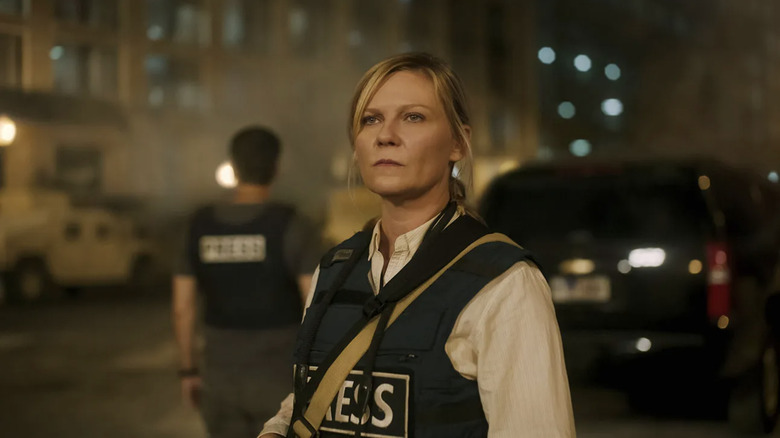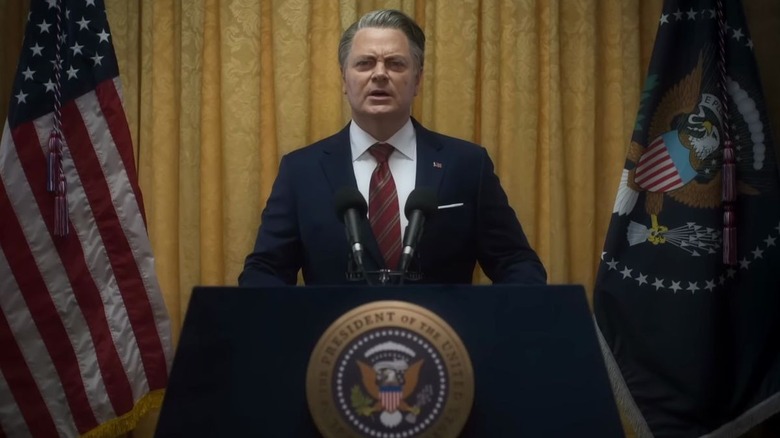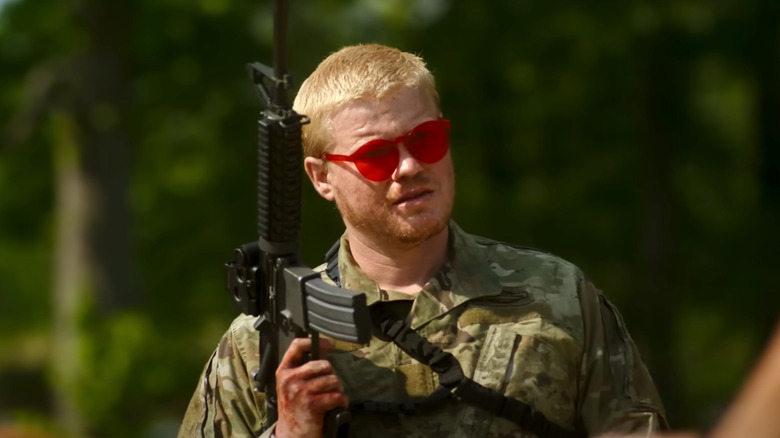Civil War Review: Alex Garland's Terrifying War Movie Will Leave You Shaken [SXSW 2024]
The most disarming thing about writer/director Alex Garland's "Civil War" is its deliberate, harrowing sense of neutrality. Here is a major movie, one of the biggest ever produced by studio A24, about a brutal civil war being fought on three fronts in the modern United States, being released into theaters during a period of intense political unrest that chooses immersion over perspective. It's a choice that doesn't always click throughout the film's running time, but it pays off in a big way during the film's harrowing, terrifying final act.
Those hoping to have their personal beliefs mirrored in one way or another, to have Garland pick a side and validate a certain point of view, will be left wanting. And those hoping for a movie that is more loudly specific about its intentions may find its intentionally vague politics to be a cop out. But the key to "Civil War" lies in the choice of protagonists. Garland largely tells the story from the perspective a group of journalists traveling a war-ravaged America in search of a big story in the final days of the conflict. They're an objective bunch — the nature of their job demands it, as they float between several sides of the conflict to capture what's going on — and the movie follows suit.
"Civil War" is less about the politics of right now, and more about the horror that accompanies a world beyond politics, where all meaning gets lost in gunfire and smoke. No one knows what they believe at this point, and no one even discusses why they're fighting anymore. It's not a film about a divided America in the sense that we, folks doom scrolling in 2024, think of it. It's a film about how all of that ceases to matter when the violence starts. What the hell were we fighting about anyway?
The road trip movie from hell
All of Garland's films blend disconcerting horror and staggering beauty, and "Civil War" doesn't buck the trend. Like the veteran war photographer Lee (played with a understated toughness by Kirsten "Hey, I've Been Undervalued For Years And Now I'm Going To Strut My Stuff" Dunst), Garland's camera recognizes the unusual beauty and surreality that can accompany images of tremendous stress and terror. Quick flashes of joy and humanity accompany a visit to a refugee camp, where people seem happy to just be alive. Snipers casually patrol the roofs of small towns. One especially unsettling sequence, a standoff with a sniper at a long-abandoned roadside Christmas experience, is the kind of haunting scene that gives the film its specific nightmare heartbeat. Something so typical and tacky, something so American, becomes the site of total inhumanity.
As Ellie and her crew head south, hoping to reach Washington D.C. to secure an interview with the President of the United States before the capital falls, the film follows a familiar road trip formula. Some vignettes are more effective than others. Some pit stops are little short stories unto themselves, a "day in the life" of these four journalists as they struggle to do their jobs. Others exist to just let characters tell each other their life stories (the weakest moments of the film, frankly). A few allow Garland, who expressed such a fascination with the corruption of worlds both natural and manmade in films like "Annihilation" and "Ex Machina," to just turn his camera toward impossible, startling imagery and to just let us exist in it all.
It's no accident that these images, among the most haunting of the film, often barely draw the eyes of the folks on the screen. It's that objective voice that steers the film from frame one — this is their reality now, they've seen this before, and they're on the hunt for something bigger. And hopefully something final.
A warning from a world too-much like our own
As a road trip movie, "Civil War" is quite good, with some segments proving more enthralling than others. Dunst is the standout among the cast, keeping us anchored through the more episodic elements, but Wagner Moura, Stephen McKinley Henderson, and Cailee Spaeny contribute strong work (with Jesse Plemons and Nick Offerman showing up in well-utilized cameos). However, "Civil War" roars to a different kind of life in its third act, as our battered journalists find themselves in the middle of a proper war zone, embedded with troops, and struggling to survive as they document the biggest moment in (fictional) American history. These scenes contain a rare and special power, and they pay off because of Garland's specific perspective choices, and his decision to leave clearly identifiable politics at the door. Everything that led to this feels so small now.
In its own weird way, "Civil War" is a science fiction movie, an alternate history tale of the biggest thing to happen in the United States since the Revolutionary War. And in a weirder way, it plays out like a movie that was made in an alternate reality, a film where this already happened, and where the most dramatic, iconic, horrible moments are so fresh, so embedded in the minds of a theoretical audience, that no exposition or world-building is necessary. We bear witness to monumental turns of events, and they're filmed through a lens that yes, of course we recognize this moment. We all saw it on the news. It's in all the textbooks now. Everyone knows that photo.
So when the film asks us to accompany the characters into one of the most relentless war sequences of recent years, there's an unusual sense of decorum. We're bearing witness to an exacting recreation of historical events that haven't actually happened. And we, the audience from this reality, are asked to take it all as a warning. This is the movie that gets made if we don't fix our sh*t. And these events, recorded with such raw reality by Garland and his crew, are exactly what we want to avoid at all costs.
/Film Rating: 8.5 out of 10


